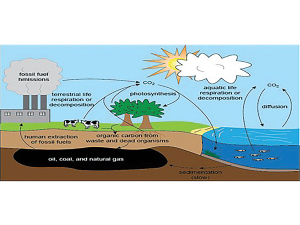Climate change a constant!
OPINION: Leo Cooney's opinion article (December 5) “Carbon Credits a Discredit” rekindled for me questions about climate change, the ETS, and indeed the whole matter of climate change formerly known as global warming.
 Plants need carbon dioxide to survive to complete their life cycle and put oxygen back into the atmosphere.
Plants need carbon dioxide to survive to complete their life cycle and put oxygen back into the atmosphere.
OPINION: There has been a lot of controversy over the past decade in regards to carbon and farming.
Many politicians and commentators claim that farming dairy cows is a major carbon polluter. However, I believe the science this is based on is very skewed and misleading.
This is because the so-called experts on this subject are only taking selective sequestration of carbon into their equation. Apart from being bad science, many people (including our youth) believe this to be the gospel.
Nothing could be further from the truth.
Sequestration by all plants is part of photosynthesis. Plants need carbon dioxide to survive to complete their life cycle and put oxygen back into the atmosphere. This is essential for the life of animals and mankind.
If all sequestration was measured, such as from all our plants – including pasture, rivers, lakes and the ocean – our major carbon sink, which surrounds both the North and South Islands – NZ would be in credit. Our ocean area is huge with air descending off the land at night, over the Pacific and Tasman, taking any methane (carbon dioxide) from our ruminants with it. This is absorbed by sequestration at sea.
If all this was measured and taken into consideration as part of the carbon cycle, the blame on farmers would be unjustified. Plants (including grass and legumes) absorb carbon dioxide from the atmosphere (breathed out by animals and humans) and in the presence of light from the sun, combine it with water (hydrogen and oxygen) from their rooting system in the soil, to make starch (carbohydrate). Oxygen remaining from the process is passed out through the plants pores (stomata) into the air for humans and animals to breath. This process is known as photosynthesis.
Methane emitted by ruminants – such as cattle, sheep, deer goats – is recycled into carbon in plants and soil in a process known as the biogenic carbon cycle. It’s an important natural cycle that’s been happening since the beginning of life. Take one out of the equation, and life is unsustainable.
I liken this to the NZ farming situation, where any carbon dioxide (methane) emitted by our animals, is rapidly sequestered by the environment around them. Our environment here in NZ is chock full of carbon sequesters – sinks – which rely on carbon dioxide to complete nature’s carbon cycle. The more livestock we have in NZ, the more grass and crops we need to grow to feed them and therefore more photosynthesis activity.
It’s time the so-called climate scientist and politicians woke up and took this all into the carbon cycle equation. To omit it is not only bad science, but dishonest and misleading.
When carbon credits are only paid out for commercial pine trees and other exotic commercial forestry, only a small portion of New Zealand’s available carbon sequestration is being evaluated. This is not only selective and unfair but bad science.
The whole nature of carbon sequestration needs to be re-evaluated honestly and to be assessed more accurately and far more scientifically for any carbon credit scheme to be credible.
Global warming has been slowly happening since the beginning of the industrial revolution, but to blame NZ farming is unfair and unjustified. The facts don’t support it.
Levin-based Leo Cooney is now retired but had a 55 year career working in the agriculture sector – including as a farmer, a MAF livestock officer and a biosecurity and animal health technician with AsureQuality.
Budou are being picked now in Bridge Pā, the most intense and exciting time of the year for the Greencollar team – and the harvest of the finest eating grapes is weeks earlier than expected.
The Real Estate Institute of New Zealand (REINZ) has released its latest rural property report, providing a detailed view of New Zealand’s rural real estate market for the 12 months ending December 2025.
Rural retailer Farmlands has released it's latest round of half-year results, labeling it as evidence that its five-year strategy is delivering on financial performance and better value for members.
OPINION: "We are back to where we were a year ago," according to a leading banking analyst in the UK, referring to US president Donald Trump's latest imposition of a global 10% tariff on all exports into the US.
DairyNZ says the Government’s proposed Resource Management Act reform needs further work to ensure it delivers on its intent.
Overseas Trade Minister Todd McClay says he's working constructively with the Labour Party in the hope they will endorse the free trade agreement (FTA) with India when the agreement comes before Parliament for ratification.